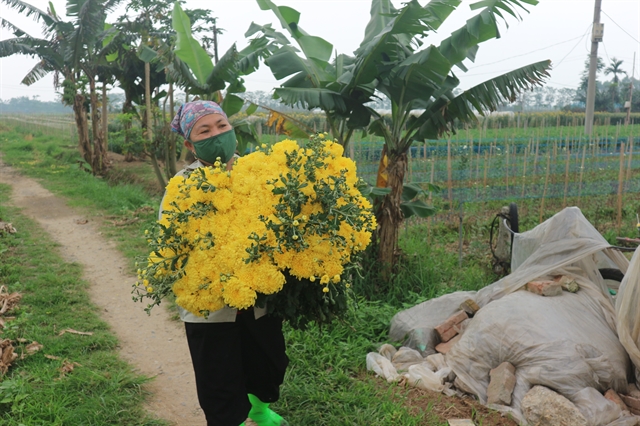 Society
Society

Like other residents of Hạ Lôi Village in Hà Nội’s Mê Linh District, Nguyễn Huy Hà rejoiced when seemed to be returning to normal after the lockdown period was lifted on May 6.

|
| A flower grower from Hạ Lôi Village in Hà Nội’s Mê Linh District harvests yellow chrysanthemums. VNA/VNS Mạnh Khánh |
HÀ NỘI — Like other residents of Hạ Lôi Village in Hà Nội’s Mê Linh District, Nguyễn Huy Hà rejoiced when their life seemed to be returning to normal after the lockdown period was lifted on May 6.
However, his joy was short-lived.
“During the quarantine period, we suffered a massive loss. Our flowers had blossomed, but there were no traders to buy them and we were not allowed out to do something and rescue our gardens,” said Hà, while standing by a flower bed.
“Once the blockade was removed, we picked as many flowers as possible to make some money,” he told Dân Việt online newspaper.
Losses reached an estimated VNĐ30 billion (US$1.2 million), according to local authorities.
It can’t be denied that the COVID-19 pandemic has seriously hit the flower gardens and the lives of local residents, and the first and most urgent task for them now is resuming production.
Mê Linh is dubbed the largest flower market in the northern region.
Watch our video on the lifting of Lockdown at Hạ Lôi
Hạ Lôi has over 800 houses engaged in the trade with 100ha of flowers. The village supplies the capital city as well as also other provinces and cities across the country.
Flower cultivation is the key trade, helping to reduce poverty and improve farmers' incomes.
Tạo, another grower, agreed, saying as a famous flower-growing centre in Hà Nội, Hạ Lôi Village was once busy with buyers and sellers, but now the flower gardens had been left neglected.
During the blockade, the majority of flower gardens were damaged. The flowers either withered after many days without care or suffered from diseases.
It could take at least two months to revive the flower beds, he said, adding that the revenue earned from this crop might be not enough to cover medicine and labour costs.
“We have suffered heavy economic losses due to the disease but we strictly followed regulations on isolation as stopping the pandemic was the main goal, ” said Hoa, a local resident.
She said she hoped they would receive support from the Government to overcome their difficulties.
Response measures
Đặng Thị Bảy said she planned to plant white chrysanthemums instead of yellow ones after harvesting this crop.
“I will not abandon the land due to the pandemic because my family relies on this source of income,” she said.
According to Đoàn Văn Trọng, chairman of Mê Linh District’s People’s Committee, the district had made a detailed plan to get economic activities in Hạ Lôi back on track.
Local authorities would invite scientists to guide growers on how to care and revive their land to ensure the plants’ strong development.
The district’s People’s Committee would ask the city’s Department of Industry and Trade to assist with advertising to facilitate the sale of flowers from Hạ Lôi, helping locals stabilise their lives.
Phạm Thành Đô, head of the district’s Economic Division, said after the lockdown, farmers were being trained how to take care for their plants using biological products to assure safety for consumers.
The district also warned farmers not to expand flower cultivation in accordance with the plan, and switch to food crops to ensure they had enough to eat.
Hạ Lôi Village was put under lockdown on April 8 after it reported 13 coronavirus infections
Accordingly, more than 2,900 households with more than 10,800 people were quarantined at home.
During the lockdown, residents who wished to go out had to obtain written approval, while others were only allowed to leave their houses for essential purposes and travel within the village. Village officials also took on the role of delivering food and groceries to residents.
The village ended its 28-day lockdown on May 6 after reporting no new infections for 21 days.
After the lockdown, the village will still have teams responsible for providing health checks for the residents, ensuring basic preventive measures are still applied and quickly identifying any suspected cases of infection. — VNS




